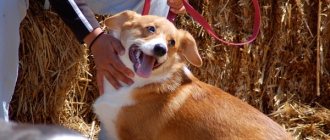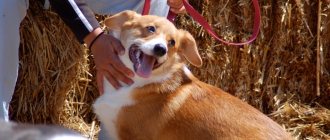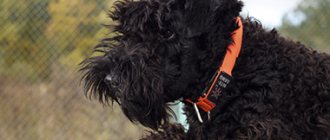Sometimes dog breeders encounter problems with their pets such as coughing. Dogs, like people, cough for a variety of reasons. A dog’s cough can be foamy, dry or wet, whistling or occurring when lying down, in a certain season, and so on. It is important to understand why does my dog cough and spit up white foam?, and for this you need to become familiar with the types of coughs and their origins. Remember that it is important to contact a veterinarian without delaying the visit.
Symptoms accompanying cough
Coughing in dogs is not usually the only symptom; other signs of developing diseases may also be seen. Pay attention to these accompanying signs
:
- does the dog have nasal discharge?
- redness of the conjunctiva of the eyes or discharge from them;
- whether foam comes out of the mouth when coughing;
- whether the dog is losing appetite and weight;
- whether she became lethargic and depressed;
- whether cough, shortness of breath and wheezing appear when breathing after physical activity;
- Is the dog sneezing?
- how often she breathes at rest;
- Is there any coughing or vomiting?
These observations will later help the veterinarian clarify the diagnosis, since, we repeat, there are quite a few reasons for the occurrence of this symptom.
Treatment methods
Any treatment begins with a diagnosis. If it turns out that wheezing and difficulty breathing in a toy terrier occurs as a result of the progression of the disease, it is necessary to begin treatment immediately.
NOTE!
It is necessary to undergo radiography, laryngo-tracheo-bronchoscopy and other types of diagnostics.
- Tracheal collapse in toy terriers is treated with medication. Treatment takes a lot of time, but the outcome of therapy is usually positive.
The treatment plan usually looks like this:
- prescribing drugs that can dilate the airways (for example, the drug aminophylline, which is a bronchodilator);
- taking antibiotics to restore the ciliated epithelium, remove pathogenic microbes, eliminate infection;
- strict diet to identify irritating symptoms;
- when a blue tongue appears, tranquilizers are sometimes prescribed to relieve shock, excitement and normalize the animal’s breathing;
- a course of oxygen therapy may be prescribed.
Animals with severe manifestations of tracheal collapse are prescribed surgical intervention, which consists of surgically installing a polypropylene or silicone implant to support the tracheal cartilages.
- For laryngospasm and laryngeal edema, medications are prescribed to help relieve swelling. Sometimes artificial ventilation is performed.
- If a foreign body enters the respiratory tract, bronchoscopy should be performed, followed by endoscopic removal.
- If wheezing is caused by allergies, the doctor will additionally prescribe antihistamines. For viral infections, respectively, antiviral drugs and immunomodulators.
Reasons why a dog coughs and spits up white foam
Not only a cold can cause a dog to cough, as many breeders think, but also some serious diseases :
- adenovirus or kennel cough;
- allergy;
- heart disease;
- neoplasm in the lungs;
- tracheal collapse;
- helminthic infestations;
- diseases of gums and teeth;
- tonsillitis;
- anatomical features (short jaw).
The most common types of cough will be discussed below.
Viral cough in dogs
A dog's cough with white foam most likely indicates a viral origin of the disease, the so-called infectious tracheobronchitis, or kennel cough. It often flares up in places where dogs are crowded, in groups, in places of mass walking and at exhibitions. Can cause illness
various pathogens: parainfluenza virus, canine distemper virus, adenovirus, reoviruses and others.
At first, the dog tries to clear his throat, as if he was choking on something , later the cough may come with vomiting . The disease is dangerous primarily for puppies and dogs with weak immunity, especially if there is a secondary bacterial infection that causes pneumonia.
Symptoms of infectious tracheobronchitis in dogs:
- cough due to inflammation of the trachea - dry and frequent:
- swollen tonsils;
- change in behavior to lethargic and passive, refusal to eat;
- When coughing, your dog may regurgitate white foam.
When diagnosing infectious tracheobronchitis in a dog, you will need to take swabs from the nose and pharynx, blood for the level of specific antibodies, and undergo an X-ray of the respiratory tract.
Immunostimulants, antibiotics, expectorants, and medicinal inhalations are used for treatment. The prognosis for recovery is favorable, animals recover completely within two weeks, unless tracheobronchitis is complicated by pneumonia.
A detailed description of the causes of cough in the Toy Terrier.
Let's look a little more closely at why a toy terrier coughs.
Viral cough.
The viral nature of the cough in a toy terrier manifests itself as tracheobronchitis or aviary cough. A pet becomes infected through contact (even for a short time) with a sick dog. In the first phase of the disease, the toy terrier coughs as if she was choking, then the disease progresses and her health deteriorates. The dog vomits frequently. Do not give medications to your pet yourself; the necessary medications must be prescribed by a veterinarian. Because, with a strong dry cough, the toy terrier needs to pick up antibiotics. If the tonsils are enlarged, the animal is prescribed expectorants. Also, the dog doctor will prescribe anti-cough medications to relieve irritation of the trachea.
Cough due to mechanical damage.
Mechanical damage or a foreign body in the throat of a toy terrier causes the dog to want to cough up damage of this kind. When your terrier tries to independently get rid of a foreign object stuck in, say, his throat, he will grunt and wheeze, trying to regurgitate the obstacle. In this case, cases of bleeding are not uncommon, since a foreign body can scratch the internal organs of the animal.
Incessant cough.
The incessant cough of the terrier, as if he was choking, should cause your next action - examining the pet for a foreign body. Toys are great hunters of picking up something from the ground. Therefore, we examine the dog’s oral cavity and larynx for the presence of foreign objects. This happens when the toy terrier quickly swallows food, which is typical for this breed. Or, the collar may press on your pet during walks. When the toy pulls on the leash, the collar digs into his throat and the animal suffocates. If you see the cause of the cough in a tight collar, then try loosening it.
Allergic cough.
You can distinguish a cough of allergic origin by the fact that coughing attacks appear depending on the season. Also, a cough can manifest itself as an allergy to insect bites or parasites, chemicals, dust or food. An allergic cough, as well as the allergy itself, should be treated only after a final determination of the reasons that caused such a reaction. In addition to coughing, allergy symptoms include tearing from the eyes, frequent sneezing, redness of the eyes, cyanosis on the gums, and rarely, skin rashes.
Cough when infected with parasites.
If the terrier has an increasing cough when lying down, increased fatigue, or a deterioration in the dog’s appearance due to weight loss, we can talk about the pet being infected with parasites (toxacara and hookworm). A larva or adult parasite that enters a dog’s body ends up in the animal’s lungs through the bloodstream and rewards your pet with tracheobronchitis, dirofilariasis and other bad inflammations.
Heart cough.
When the cardiac mitral valve of a toy terrier is damaged, the enlarged heart, coupled with fluid accumulating in the lungs, puts pressure on the trachea and provokes a cough, which is called “cardiac”. With this disease, in addition to a uterine muffled cough, the pet has a bluish color of the gums and a decrease in activity. In principle, this disease is more common in large breed dogs than in miniature toy dogs.
Lung problems.
A pulmonary tumor also causes the little terrier to cough. Relief occurs with the use of bronchodilators (for reduced activity and mobility), steroids (for shortness of breath), and bronchodilators (for arrhythmia).
Hypothermia.
Hypothermia of the terrier, which most often occurs due to the negligence of the owners (bathing the dog in cool water in the heat, walking in clothes not suitable for the weather, feeding ice cream). All these actions lead to inflammation of the tonsils and your pet tries to push out the “irritant” by coughing.
Age-related cough.
Old dog coughing. An old dog is characterized not so much by a cough as by coughing, since the bronchi work worse and there is a spasm of the larynx. An elderly dog begins to cough after or during a brisk walk, and this occurs against a background of shortness of breath.
Cough due to fur.
A young dog may cough when his own fur gets inside him. This cough is easily distinguished by both the sound and appearance of the pet.
Foreign bodies and injuries as causes of cough
If the dog coughs, wheezes , trying to cough up, and blood may appear, then he may have swallowed a foreign object, as sometimes happens in dogs and cats. This is how a dog may cough due to collar asphyxia , an inability to breathe normally due to a tumor or fluid in the lungs. This condition requires immediate attention to a veterinarian
.
- Characteristic signs of a foreign body and injury as the reasons why a dog coughs and vomits white foam:
- the dog is trying to burp something
- Possible vomiting in the dog, foam mixed with blood
- dry wheezing when breathing due to narrowing of the lumen of the trachea or bronchi
- refusal of food and drink
- foamy mucus from nasal passages
If such symptoms appear, a doctor should be called to see the animal as soon as possible.
Cough as a symptom of allergies in dogs
It happens that in dogs, cough , like in people, occurs as a reaction to allergens - pollen, chemical compounds, dust, cigarette smoke, food additives in food, etc. Then accompanying symptoms
: sneezing, red eyes, watery eyes, cyanosis of the mouth, and skin rashes. Treatment is prescribed by a veterinarian after making a diagnosis and determining the causes of allergic reactions in the animal.
Cough in dogs: how to provide first aid
Faced with unusual symptoms, owners are wondering what to do if their dog is choking and coughing. If there is no nearby veterinary clinic, you need to be able to provide first aid to an injured pet:
- pinch your nose and gently run your palm over the throat area - used for the development of “reverse sneezing” syndrome;
- turn the dog over on its back (the body and paws should be higher than the head), gently shake and pat its back;
- in case of a large individual, they raise their hind legs and slap the chest.
Important! With the right approach, the dog will stop coughing and will not have a sore throat. If you can’t help, then you need to call a veterinarian.
Help if your dog is choking
Important points
What to do when your dog is choking and can’t clear his throat? It is necessary to ensure free access of oxygen and perform a cardiac massage:
- The animal is placed on a flat surface.
- You need to open your nostrils and exhale forcefully.
- Hands are placed on the ribs and press on them every 5 seconds.
- Repeat for at least 10 minutes.
Important! After the mucous membranes return to their natural color, call a veterinarian. Until help arrives, the dog is not moved and its condition is monitored.
The depth and length of the inhalation depends on the size of the pet. The larger it is, the greater its needs. The owner should not let the situation take its course and after successfully getting rid of suffocation, he will have to visit a veterinarian with the animal for diagnosis.
The dog is coughing and vomiting white foam, possibly due to helminthic infestations
If an animal suffers from coughing, wheezing with regurgitation of white foam , then infection with parasites is possible. Some types of worms can migrate throughout the body, including living in the lungs, heart, esophagus, and stomach of the host. In addition to coughing, there are digestive disorders (poor appetite, vomiting, constipation), lethargy, dull hair, mucus and blood in the feces. Dirofilariasis, toxocariasis, ascariasis, and infection with esophageal worms are especially dangerous. Therefore, it is so important to promptly diagnose and treat helminthic diseases, and even better, to prevent them through quarterly deworming of your pet.
Causes of "heart" cough in dogs
May occur in older dogs due to deformation of the mitral valve. The heart increases in size to compensate for the lack of circulation. Stagnant processes in the pulmonary circulation cause fluid accumulation in the lungs. This leads to compression of the trachea and a “heart cough.”
- Associated symptoms with “heart cough” in dogs:
- the dog coughs dully from inside
- decreased animal activity
- there are signs of ascites (fluid accumulation in the abdominal cavity
- Over time, coughing becomes more frequent and intense
- the oral mucosa may be bluish
Heart diseases, unfortunately, are rarely cured completely; the doctor’s task is to select a treatment that will improve heart function, and thereby stop coughing attacks in a dog
.
Additional symptoms to watch out for
If the dog is coughing as if he is choking, you should check for a dry nose, activity of the animal, and presence of discharge from the lacrimal glands. Be sure to monitor whether the animal’s appetite has changed. It is very important to understand the nature of your four-legged pet’s cough. It can be dry, expectorant, moist or hard. Monitor how long the cough continues.










